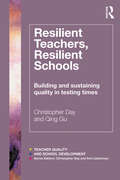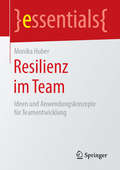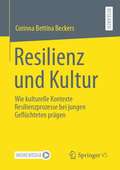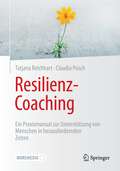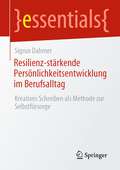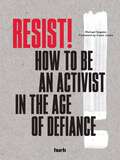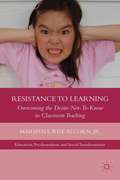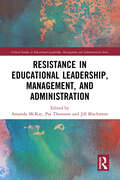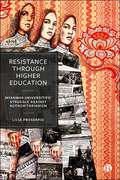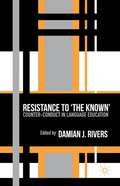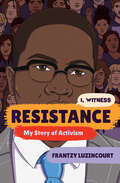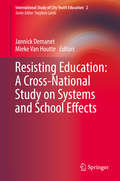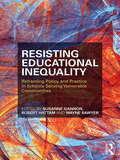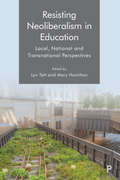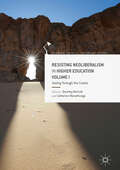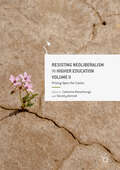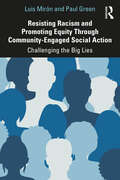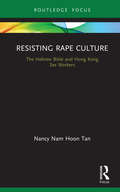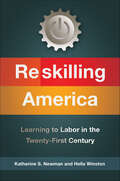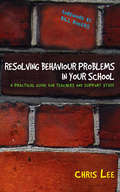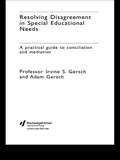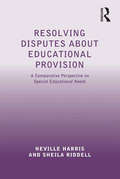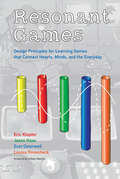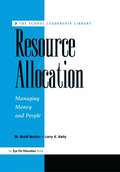- Table View
- List View
Resilient Teachers, Resilient Schools: Building and sustaining quality in testing times (Teacher Quality and School Development)
by Christopher Day Qing GuThis book unpicks the complex, dynamic blend of individuals’ psychological and professional assets, workplace conditions and leadership support which enable teachers who stay in teaching to continue to make a difference in their careers, regardless of shifts in policy, workplace, professional and personal circumstances. Whilst much has been written over the years about teacher stress and burnout, there is very little research which reports on the conditions which are essential for teachers to sustain their commitment and effectiveness over their professional lives, in contexts of challenge and change. Drawing upon a range of educational, psychological, socio-cultural and neuro-scientific research, together with vivid accounts from teachers in a variety of primary and secondary schools internationally, and from their own research on teachers’ work and identities, the authors discuss the dynamic nature, forms and practices of teacher resilience. They argue that resilience in teachers is not only their ability to bounce back in extremely adverse circumstances but that it is the capacity of teachers for everyday resilience which enables them to sustain their commitment and effectiveness in responding positively to the unavoidable uncertainties inherent of their professional lives. The authors conclude that resilience in teachers can be nurtured by the intellectual, social and organisational environments in which teachers work and live, rather than being simply a personal attribute or trait, determined by nature. Resilient Teachers, Resilient Schools will be of key interest to policy makers, head teachers, teachers and training and development organisations who wish to improve quality and standards in schools.
Resilienz im Team: Ideen und Anwendungskonzepte für Teamentwicklung (essentials)
by Monika HuberDieses essential gibt Einblicke in Ansätze, Vorgehensweisen und Ideen, wie sich Resilienz, verstanden als Widerstandskraft, im Team fördern und umsetzen lässt. Meist werden diese Konzepte nur auf Einzelpersonen angewendet. Doch viele der Erkenntnisse aus der Resilienzforschung lassen sich auf Teams übertragen und sogar erweitern. So spielt Resilienz heute auch in Teams eine immer größere Rolle: Sei es, um das Kohärenzgefühl nach Antonovskys Prinzip der Salutogenese zu stärken, oder um andere Resilienzfaktoren in Betracht zu ziehen, die die Teamfähigkeit unterstützen.
Resilienz und Kultur: Wie kulturelle Kontexte Resilienzprozesse bei jungen Geflüchteten prägen
by Corinna Bettina BeckersDie Monographie analysiert das Verhältnis der wissenschaftlichen Konstrukte „Resilienz“ und „Kultur“ und postuliert auf Basis ihrer empirischen Befunde wichtige Interdependenzen im Sinne einer Cultural Resilience. Kulturelle Aspekte von Bewältigung wurden in mehr als 50 Jahren Resilienzforschung nur wenig beachtet. In Abgrenzung hiervon lässt sich die Masterarbeit einordnen in eine innovative Forschungswelle, die Resilienz als kulturell eingebettet definiert. Kulturelle Resilienz wird als basaler Referenzpunkt für Interventionsdesigns bewertet, die auf effektive Förderung der Resilienzfähigkeit (junger) Geflüchteter abzielen. Die qualitative Studie, die spätestens mit dem „Sommer der Migration“ 2015 von besonderer Relevanz für Sozialarbeitswissenschaft wie Praxis der Sozialen Arbeit ist, leistet so einen Beitrag zur Bearbeitung des Forschungsdesiderates zur kulturellen Kontextabhängigkeit von Resilienz
Resilienz-Coaching: Ein Praxismanual zur Unterstützung von Menschen in herausfordernden Zeiten
by Tatjana Reichhart Claudia PuschIn diesem Buch vermitteln Ihnen die Fachärztin für Psychiatrie und Verhaltenstherapeutin Dr. Tatjana Reichhart und die systemische Beraterin, Therapeutin und Lehrtrainerin Claudia Pusch, wie Sie Menschen konkret und praktisch dabei unterstützen können, ihre seelische Widerstandsfähigkeit auszubauen und zu stärken. Die Zielgruppen sind Coaches, Therapeuten, Führungskräfte, Sozialpädagogen, Yoga-Lehrer und alle jene, die mit Menschen arbeiten. Dabei räumen die Autorinnen mit Irrtümern über das Konzept der Resilienz auf, bleiben stets wissenschaftlich fundiert und gleichzeitig leicht verständlich sowie praktisch orientiert. Das Besondere an ihrem Ansatz ist die Zusammenführung ihrer beider unterschiedlichen praktischen Erfahrungshorizonte und Hintergründe. Dieses Buch bringt somit unterschiedliche Techniken und Erkenntnisse aus anerkannten psychologischen Ansätzen zusammen und stellt sie als alltagstaugliches Praxismanual erstmalig in den Kontext des Resilienz-Coachings. Sie als Leser erhalten so einen umfangreichen Wissen- und Methodenschatz, der durchgängig auf der aktuellen Forschungs- und Erkenntnislage über Resilienz und deren Förderung basiert. In der von den beiden Autorinnen geründeten Kitchen2Soul Akademie wird die Ausbildung zum Resilienz-Coach angeboten.
Resilienz-stärkende Persönlichkeitsentwicklung im Berufsalltag: Kreatives Schreiben als Methode zur Selbstfürsorge (essentials)
by Sigrun DahmerDie Anforderungen im Berufsalltag werden immer belastender. Das kreative Schreiben ist ein einfaches und gleichzeitig effizientes Mittel, um Stress abzubauen und Selbstwirksamkeit zu erfahren. Die spielerischen Übungen machen nicht nur Spaß und fördern das kreative Potential, sondern sie dienen auch als Mittel der Selbstreflexion und unterstützen den Aufbau von psychischen Selbstfürsorgestrategien im (Berufs-) Leben. Insgesamt hilft uns das kreative Schreiben dabei, Resilienz aufzubauen, indem wir starke Gefühle abkühlen, schwierige Ereignisse ordnen und eingefahrene Denkwege verlassen.
Resist!: How to Be an Activist in the Age of Defiance
by HuckResist! is the indispensable how-to guide for people looking to make a stand. Included are solid pieces of advice, practical tips and inspirational stories from those who have already successfully stood up and made a difference. Learn the principles of direct action, discover strategies for tackling social media, unearth ideas for motivating others, and understand how to get access to the people in power and get your message across.With a foreword by columnist, campaigner and best-selling author Owen Jones which unravels the political world and underlines why now is the time to act.
Resistance To Learning
by Marshall Wise Alcorn Jr.Alcorn examines qualities of student resistance to new and uncomfortable information and proposes methods for teachers to work productively with such resistance. Drawing on research from numerous disciplines showing how emotion grounds human reason, he outlines an agenda that makes emotional experience central to educational practice.
Resistance in Educational Leadership, Management, and Administration (Critical Studies in Educational Leadership, Management and Administration)
by Pat Thomson Jill Blackmore Amanda McKayThis edited volume brings together a range of perspectives on Educational Leadership, Management and Administration (ELMA) and various theories of resistance or compliance along with how policy and politics play out in school communities.The book makes a significant contribution to debates around theorising educational leadership and the implications of discourses on schooling and the politics of education. It brings together a broad array of international scholars to examine theories of resistance in ELMA and establish a resistance-oriented agenda for critical ELMA research that promotes change and diverse ideas about leadership. Using both empirical data and conceptual analysis, the chapters provide opportunities for theorising the work and working conditions of educational leaders alongside questions of compliance and resistance that further improve the understanding of these concepts in the field.Providing cutting-edge research and theorisation into this emerging area, the book will be highly relevant for researchers, academics, and postgraduate students in the fields of educational leadership, management and administration, and educational policy. It will also be of interest to school leaders.
Resistance through Higher Education: Myanmar Universities’ Struggle against Authoritarianism
by Licia ProserpioIn February 2021, Myanmar experienced the third coup d’état in its modern history. Unprecedented strength was displayed by Myanmar civil society as it fought back against these new authoritarian drives. Where did this strength come from? Fearing the loss of the benefits gained in the previous decade of reforms (2011–2021), students, teachers, professors, and activists fuelled the Spring Revolution. To understand what is happening in Myanmar, this book outlines the historical efforts by Myanmar universities to advocate for a more just society and offers unique insight into the long-lasting struggle of education against authoritarianism. By exploring Myanmar’s social and political struggles through the lens of higher education resistance, the book offers a compelling narrative about the life of the country following the latest coup d’état, an event that continues to puzzle the international community.
Resistance to the Known
by Damian J. RiversThis volume stands as a demonstration of resistance to 'the known' (i. e. the tyranny of the expected) through individual and collective counter-conduct within the domain of language education. Supported by data drawn from various local and national contexts, the professional experiences of the authors reveal how the pedagogies, practices, and policies of 'the institution' often reflect an imperative to provide a brand of language education disinterested with the ideological and political foundations of its own imposition. While being forthright in its quest to resist and deconstruct certain 'knowns', the primary sentiment underpinning this volume does not withhold the hand of reconciliation, recreation and reconstruction. As a project of hope, this volume reminds all language educators that our role is multifaceted, continual and cast in service not of our special interest groups, our institutional paymasters, or ourselves, but rather of the individual students who trust that our professionalism will support them in a self-authoring an empowering educational experience without compromising their integrity as human beings.
Resistance: My Story of Activism (I, Witness #0)
by Frantzy Luzincourt Zoe RosenblumA young activist opens a window for young readers into his fight for equal education, racial justice, and economic equity. Born in Brooklyn, New York, to Haitian immigrants, Frantzy Luzincourt has dedicated his life to service and the empowerment of youth voices. When he was fifteen, Frantzy became the founding president of his high school’s Black Student Union, where he advocated for more Black male teachers and for bringing social justice into school curriculum. Frantzy now fights to ensure that all students, no matter their background, have access to equitable schools where young voices are championed. After the murder of George Floyd in 2020, Frantzy and his friends formed the Strategy for Black Lives coalition, which centers youth voices and mobilizes communities to fight against racism, discrimination, and inequity. His passion for education and criminal justice reform are integral to his identity as a young Black man. With a voice that is both accessible and engaging, Frantzy brings forward a captivating first-person account of determination, activism, and empowerment in America. The I, Witness series delivers compelling narrative nonfiction by young people, for young people.
Resisting Education: A Cross-National Study on Systems and School Effects (International Study of City Youth Education #2)
by Mieke Van Houtte Jannick DemanetThis book focuses on how school-level features affect student resistance to education from a comparative angle, taking into account cross-national differences. All over the world, policy makers, school administrators, teachers, and parents are dealing with students who resist education. Resisting school might ultimately lead to unqualified dropout, and it is therefore crucial to understand what triggers resistance in students. The book uses the ISCY data set to study multilevel questions in detail. It does so based on the view that system effects and school effects intertwine: system-level policy measures affect student outcomes in part by shaping school-level features, and school effects may differ according to certain system-level features. We start from an overarching theoretical framework that ties the various city-specific insights together, and contains empirical studies from Barcelona, Bergen, Ghent, Montréal Reykjavik, Sacramento, and Turku. It shows that, in all countries, the act of resisting school is more likely to occur among the socio-economically disadvantaged, and those in the most disadvantaged schools. However, educational system features, including tracking, free school choice, and school autonomy, are important driving factors of the differences between schools. As such, systems have the tools to curb between-school differences in resistance. Previous research turns resistance into a problem of individual students. However, if school or system features engender resistance to school, policy initiatives directed at individual students may solve the problem only partially.
Resisting Educational Inequality: Reframing Policy and Practice in Schools Serving Vulnerable Communities
by Robert Hattam Wayne Sawyer Susanne GannonResisting Educational Inequality examines poverty, social exclusion and vulnerability in educational contexts at a time of rising inequality and when policy research suggests that such issues are being ignored or distorted within neoliberal logics. In this volume, leading scholars from Australia and across the UK examine these issues through three main focus areas: Mapping the damage: what are our explanations for the persistent nature of educational inequality? Resources for hope: what do we know about how educational engagement and success can be improved in schools serving vulnerable communities? Sustaining hope: how might we reframe research, policy and practice in the future? Using a range of theories and methodologies, including empirical and theory-building work as well as policy critique, this book opens innovative areas of thinking about the social issues surrounding educational practice and policy. By exploring different explanations and approaches to school change and considering how research, policy and practice might be reframed, this book moves systematically and insightfully through damage towards hope. In combining pedagogy, policy and experience, Resisting Educational Inequality will be a valuable resource for all researchers and students, policymakers and education practitioners.
Resisting Neoliberalism in Education: Local, National and Transnational Perspectives
by Lyn Tett Mary HamiltonNeoliberalism has been widely criticised because of its role in prioritising ‘free markets’ as the optimum way of solving problems and organising society. In the field of education, this leads to an emphasis on the knowledge economy to the detriment of wider social and ethical goals in ways that reduce both persons and education to solely economic actors. Drawing on an international range of contexts across informal, adult, school and university settings, this book provides innovative examples that show how neoliberalism in education can be challenged and changed at the local, national and transnational levels in order to foster a more democratic culture.
Resisting Neoliberalism in Higher Education Volume I: Seeing Through the Cracks (Palgrave Critical University Studies)
by Dorothy Bottrell Catherine ManathungaIn light of the overwhelming presence of neoliberalism within academia, this book examines how academics resist and manage these changes. The first of two volumes, this diptych of critical academic work investigates generative spaces, or ‘cracks’ in neoliberal managerialism that can be exposed, negotiated, exploited and energised with renewed collegiality, subversion and creativity. The editors and contributors explore how academics continue to find space to work in collegial ways; defying the neoliberal logic of ‘brands’ and ‘cost centres’. Part I of this diptych illuminates the lived experiences of changing academic roles; portraying institutional life without the glossy filter of marketing campaigns and brochures, and revealing generative spaces through critical testimony, fiction, arts-based projects, feminist and Indigenous critical scholarship. It will be of interest and value to anyone concerned with neoliberalism in academia, as well as higher education more generally.
Resisting Neoliberalism in Higher Education Volume II: Prising Open The Cracks (Palgrave Critical University Studies)
by Dorothy Bottrell Catherine ManathungaThis book outlines the creative responses academics are using to subvert powerful market forces that restrict university work to a neoliberal, economic focus. The second volume in a diptych of critical academic work on the changing landscape of neoliberal universities, the editors and contributors examine how academics ‘prise open the cracks’ in neoliberal logic to find space for resistance, collegiality, democracy and hope. Adopting a distinctly postcolonial positioning, the volume interrogates the link between neoliberalism and the ongoing privileging of Euro-American theorising in universities. The contributors move from accounts of unmitigated managerialism and toxic workplaces, to the need to decolonise the academy to, finally, illustrating the various creative and counter-hegemonic practices academics use to resist, subvert and reinscribe dominant neoliberal discourses. This hopeful volume will appeal to students and scholars interested in the role of universities in advancing cultural democracy, as well as university staff, academics and students.
Resisting Racism and Promoting Equity Through Community-Engaged Social Action: Challenging the Big Lies
by Paul Green Luis MirónThis book challenges pre-service and in-service educators to reflect critically on their assumptions and engage in praxis promoting racial and social equity. Grounded in policy contexts, historical understandings, and critical theories, this book describes innovative community-engaged approaches to resisting racism and promoting equity and features reflections and personal narratives from partners in change—including on-the-ground activists, voices from younger and older generations, educators, and first-time writers. Fueled by the ideology of white supremacy for over four centuries that whites matter more than Blacks, the authors argue that racial inequities exacerbated during the Trump administration and the legacy of neo-liberal policies dating to the "New Federalism" fiercely necessitate invoking community-engaged strategies to advance equity. This book advocates for collaboration among schools, community organizations, businesses, university centers, and community activists to address historically pressing issues, including systemic racism, declining educational opportunities, limited access to ongoing health care, and the decline of civility in public life.
Resisting Rape Culture: The Hebrew Bible and Hong Kong Sex Workers (Rape Culture, Religion and the Bible)
by Nancy Nam TanResisting Rape Culture tackles controversial and harrowing rape myths prevalent in rape culture: namely that sex workers do not get raped, and that they are deserving victims of sexual violence. Commonly, sociocultural discourses depict sex workers as morally deficient and promiscuous, having sex with multiple clients in exchange for payment. Consequently, they are often considered deserving of rape, sexual assault and other forms of abuse, or as people who should expect to receive such treatment. In a way, the Hebrew Bible contributes to such stigmatization of and discrimination against sex workers, given first, its authority and second, its negative portrayals of prostitutes as outsiders. This cutting-edge book describes the rape culture in Hong Kong, focusing on how Hong Kong Christians interpret the Bible concerning prostitutes, and in turn how this affects the treatment of sex workers. Arguably, when interpretations malign the prostitutes in the Bible, and do not critique how the Bible portrays these women, we promote the stigmatization of sex workers and, in doing so, normalise and trivialise sexual discrimination, abuse and violence, ultimately promoting rape culture.
Reskilling America: Learning to Labor in the Twenty-First Century
by Katherine S. Newman Hella WinstonFrom Katherine Newman, award-winning author of No Shame in My Game, and sociologist Hella Winston, a sharp and irrefutable call to reenergize this nation's long-neglected system of vocational trainingAfter decades of off-shoring and downsizing that have left blue collar workers obsolete and stranded, the United States is now on the verge of an industrial renaissance. Companies like Apple, BMW, Bosch, and Volkswagen are all opening plants and committing millions of dollars to build products right here on American soil. The only problem: we don't have a skilled enough labor pool to fill these positions, which are in many cases technically demanding and require specialized skills. A decades-long series of idealistic educational policies with the expressed goal of getting every student to go to college has left a generation of potential workers out of the system. Touted as a progressive, egalitarian institution providing opportunity even to those with the greatest need, the American secondary school system has in fact deepened existing inequalities, leaving behind millions of youth, especially those who live in the de-industrialized Northeast and Midwest, without much of a future at all. We can do better, argue acclaimed sociologists Katherine Newman and Hella Winston. Taking a page from the successful experience of countries like Germany and Austria, where youth unemployment is a mere 7%, they call for a radical reevaluation of the idea of vocational training, long discredited as an instrument of tracking. The United States can prepare a new, high-performance labor force if we revamp our school system to value industry apprenticeship and rigorous technical education. By doing so, we will not only be able to meet the growing demand for skilled employees in dozens of sectors where employers decry the absence of well trained workers -- we will make the American Dream accessible to all.
Resolution No 9763 IRR of RA 10366 (Accessible Polling Place)
by Philippine Commission on ElectionsDetailed guidelines and procedures on how to implement the provisions of the law on assigning and establishing accessible polling places for persons with disabilities and senior citizens during national and local elections.
Resolving Behaviour Problems in your School: A Practical Guide for Teachers and Support Staff
by Dr Chris Lee'Lee is sensitive to the challenges that face both staff and pupils and gives many ideas for challenging and changing what we do in school. He doesn't shy away from the difficulties involved in confronting established values, offering to 'shine light' through structured staff discussion on our preconceived ideas and prejudices...this book will prove to be a useful additional reference for many working at all phases of education' - Special 'Chris Lee's book ably balances well argued and developed theoretical and practical approaches to behaviour policy and practice. There is also a consistent emphasis - a crucial emphasis- on the need to develop a collegially supportive culture in the management and support of student behaviour in schools. Again, Chris sets out useful, credible and practical guidelines for such support. I commend this book to teachers and school leaders to enable an informed, serious and grounded review of behaviour management'- Bill Rogers, Education Consultant, Author, Lecturer and Adjunct Professor of Education at Griffith University, Queensland, Australia. Dealing with difficult or inappropriate behaviour in schools can be a daunting task for any teacher, regardless of experience. This book provides insights into contemporary issues that inform better behaviour management in schools and practical advice on how to enhance it through policy and practice. Taking a whole-school policy approach, it: -looks at how the behaviour of adults, children and the school itself affect pupil behaviour - provides a framework for schools to follow, showing them how to generate their own Behaviour Policy - contains practical activities to use with a variety of staff as part of INSET/Professional Development - takes a whole staff approach and includes advice for teaching assistants and as well as teachers - offers suggestions for ways to disseminate best practice throughout the school A must read for teachers, teaching assistants and other professionals who work in schools. Chris Lee is Principal Lecturer in Education and Head of the School of Continuing Professional Development at the University of Plymouth.
Resolving Disagreement in Special Educational Needs: A Practical Guide to Conciliation and Mediation
by Irvine S. Gersch Adam Gersch Adam Gersch NfaLocal Education Authorities are now obliged to put in place arrangements to try to settle disagreements over the provision for children with special educational needs. This practical book aims to help those charged with making these arrangements and those directly involved in the conciliation and mediation process.While there is no 'right way' to resolve disputes of this kind, the ultimate goal must be to reach a positive conclusion as quickly as possible for the benefit of the child involved. In this book, the authors look at a range of approaches and issues to achieve this such as:*how to plan disagreement resolution*skills and techniques for mediation*tools for training and self-assessment*the SEN tribunal*ethical and legal issues.The book includes contributions from leading practitioners in special educational needs, law, mediation and conciliation. It is the ideal handbook for all those working in the area of special education needs, both in schools and for LEAs and other agencies.
Resolving Disputes about Educational Provision: A Comparative Perspective on Special Educational Needs
by Sheila Riddell Neville HarrisWith contributions by recognised experts in the field of education law, this book is a comparative study of the resolution of special education disputes, including via mediation. It analyses the varying approaches in England, Scotland, the US and the Netherlands and addresses major questions of dispute resolution, redress, judicial and non-judicial approaches and the protection of citizens' rights. The first review of mediation in citizen v. state disputes outside the context of the courts, this topical book also incorporates findings from a recent ESRC study into dispute resolution in special educational needs cases. It will not only be of interest to those concerned with education issues but also those interested in administrative justice, especially the role of mediation generally
Resonant Games: Design Principles for Learning Games that Connect Hearts, Minds, and the Everyday (Digital Media and Learning)
by Eric Klopfer Jason Haas Scot Osterweil Louisa RosenheckPrinciples for designing educational games that integrate content and play and create learning experiences connecting to many areas of learners' lives. Too often educational videogames are narrowly focused on specific learning outcomes dictated by school curricula and fail to engage young learners. This book suggests another approach, offering a guide to designing games that integrates content and play and creates learning experiences that connect to many areas of learners' lives. These games are not gamified workbooks but are embedded in a long-form experience of exploration, discovery, and collaboration that takes into consideration the learning environment. Resonant Games describes twenty essential principles for designing games that offer this kind of deeper learning experience, presenting them in connection with five games or collections of games developed at MIT's educational game research lab, the Education Arcade.Each of the games—which range from Vanished, an alternate reality game for middle schoolers promoting STEM careers, to Ubiquitous Bio, a series of casual mobile games for high school biology students—has a different story, but all spring from these fundamental assumptions: honor the whole learner, as a full human being, not an empty vessel awaiting a fill-up; honor the sociality of learning and play; honor a deep connection between the content and the game; and honor the learning context—most often the public school classroom, but also beyond the classroom.
Resource Allocation
by Scott, M Norton Larry KellyThis book shows you how your school can maintain its high standards despite financial obstacles. It shows you how to investigate various types and sources of money available to your school; monitor the use of scarce school resources; develop a school improvement plan which incorporates financial needs; and recruit, assign, and develop teachers and staff for maximum effectiveness.
